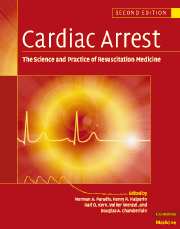Book contents
- Frontmatter
- Contents
- List of contributors
- Foreword
- Preface
- Part I Introduction
- Part II Basic science
- Part III The pathophysiology of global ischemia and reperfusion
- Part IV Therapy of sudden death
- Part V Postresuscitation disease and its care
- Part VI Special resuscitation circumstances
- 52 Prevention of sudden death in patients at risk: channelopathies and arrhythmic syndromes in the structurally normal heart
- 53 Pediatric cardiopulmonary resuscitation
- 54 Resuscitation in elder persons
- 55 Asphyxial cardiac arrest
- 56 Hemorrhagic shock and hypovolemic cardiac arrest
- 57 Cardiopulmonary resuscitation in hypothermic patients
- 58 Cardiac arrest due to poisoning
- 59 Cardiac arrest during anesthesia
- 60 Resuscitation of the pregnant patient suffering sudden cardiac death
- 61 Drowning
- 62 Anaphylactic shock
- 63 High altitude resuscitation
- 64 Electrical injuries
- 65 Rare syndromes, commotio cordis, sudden death in athletes
- Part VII Special issues in resuscitation
- Index
58 - Cardiac arrest due to poisoning
from Part VI - Special resuscitation circumstances
Published online by Cambridge University Press: 06 January 2010
- Frontmatter
- Contents
- List of contributors
- Foreword
- Preface
- Part I Introduction
- Part II Basic science
- Part III The pathophysiology of global ischemia and reperfusion
- Part IV Therapy of sudden death
- Part V Postresuscitation disease and its care
- Part VI Special resuscitation circumstances
- 52 Prevention of sudden death in patients at risk: channelopathies and arrhythmic syndromes in the structurally normal heart
- 53 Pediatric cardiopulmonary resuscitation
- 54 Resuscitation in elder persons
- 55 Asphyxial cardiac arrest
- 56 Hemorrhagic shock and hypovolemic cardiac arrest
- 57 Cardiopulmonary resuscitation in hypothermic patients
- 58 Cardiac arrest due to poisoning
- 59 Cardiac arrest during anesthesia
- 60 Resuscitation of the pregnant patient suffering sudden cardiac death
- 61 Drowning
- 62 Anaphylactic shock
- 63 High altitude resuscitation
- 64 Electrical injuries
- 65 Rare syndromes, commotio cordis, sudden death in athletes
- Part VII Special issues in resuscitation
- Index
Summary
Introduction
Cardiac arrest from poisoning results from direct effects on the cardiovascular or the central nervous system (CNS). Cardiac effects may be caused by perturbation of the autonomic system, antagonism of ion channels, or interference with myocardial metabolism. CNS active poisons cause cardiac arrest through either respiratory suppression (leading to asphyxial arrest) or CNS stimulation with seizures or severe agitation (and the resultant metabolic abnormalities). Restoration of hemodynamics often requires addressing the effects of the poisoning in addition to standard treatment of cardiac arrest.
There are very few studies of specific treatment for cardiac arrest from poisoning. The utility of some interventions, such as ensuring ventilation and oxygenation for patients with cardiac arrest due to CNS depressants, is selfevident. The last two ACLS updates include a section on the treatment of cardiac arrest from poisoning. This section was a major advance in that it recognized that cardiac arrest from poisoning is a unique situation, but it also highlighted the lack of quality data in this area. If studies of naloxone are excluded, the recommendations are based on fewer than 500 patients, and most of these data are anecdotal. A few interventions have been studied systematically in animal models of severe poisoning, but there are no systematic animal studies of therapy for cardiac arrest. Given the lack of systematic data, the treatment of cardiac arrest remains more art than science, and the standard of care is poorly defined except for initial supportive care. The recommendations in this chapter are a guide to clinicians, but they should not be considered as standard of care.
- Type
- Chapter
- Information
- Cardiac ArrestThe Science and Practice of Resuscitation Medicine, pp. 1028 - 1042Publisher: Cambridge University PressPrint publication year: 2007

